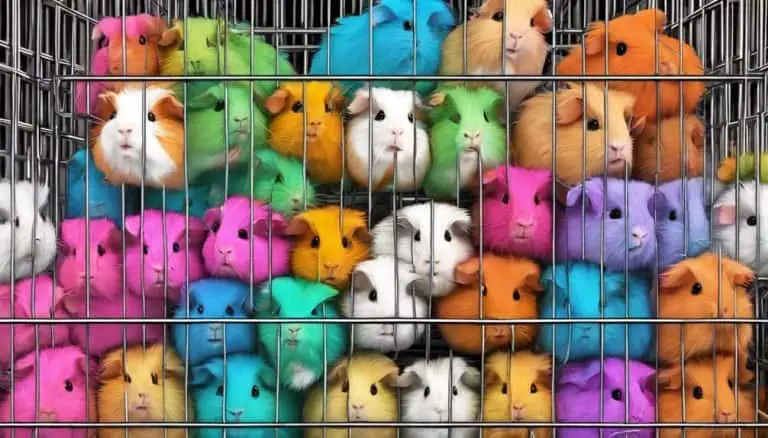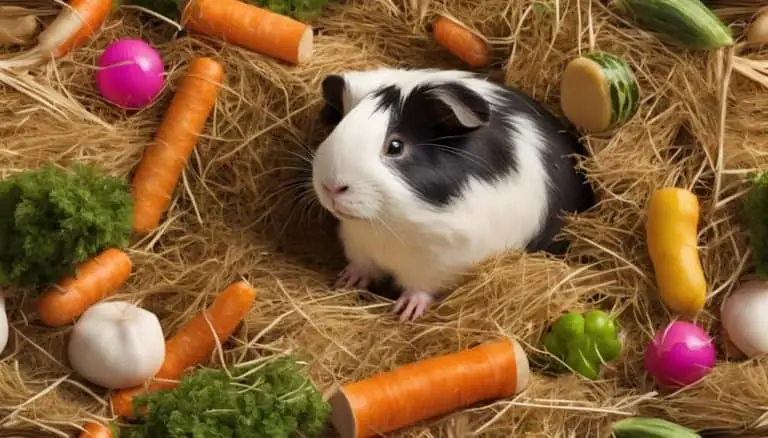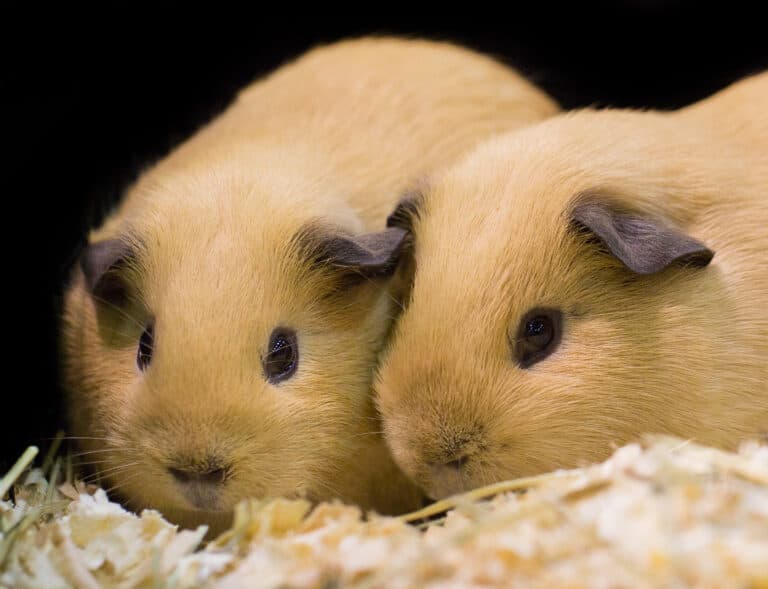Can Guineas Eat Cheese?
Guinea pigs are adorable, but you may be wondering if they can eat cheese. While some guinea pigs may enjoy the occasional snack of cheese, it is important to understand that cheese is a dairy product and therefore should not be fed too often.
Cheese contains lactose which can be difficult for guinea pigs to digest. Furthermore, cheese contains a lot of cholesterol and fat which can have an adverse effect on your pet’s health.
If you choose to feed your guinea pig cheese, do so in moderation and only as a treat. It is also important to note that some guinea pigs may be lactose intolerant and so should not consume any dairy products at all.
In general, it is best to provide your guinea pig with calcium-rich diets such as hay or vegetables rather than feeding them too much cheese.
Despite being high in calcium, cheese contains a lot of fat and sugar which can cause digestive problems for your pet if overfed – so make sure to feed your guinea pig in moderation!
Do Guinea Pigs Like Cheese?
Many people wonder if guinea pigs like cheese, and the answer is yes! Cheese is a great snack for these small creatures, but it should only be an occasional treat. Cheese can be high in fat and salt, so giving too much of it to your guinea pig can be harmful to their health.
If you do want to give your guinea pig some cheese, make sure it is low-fat and low-salt varieties. You can also offer them other treats such as fruits and vegetables as part of their regular diet. Guinea pigs love exploring new tastes, so introducing different snacks into their diet can help keep them healthy and happy!
Is Cheese Harmful to Guinea Pigs?
Cheese is a dairy product that is not recommended for guinea pigs. It can be harmful to their digestive system and can cause dehydration and electrolyte imbalances due to the high fat content.
Guinea pigs have delicate digestive systems, so cheese should be avoided as it can cause digestive disturbances such as diarrhea, bloating, vomiting, or constipation. If your guinea pig does consume cheese, keep an eye out for any adverse effects and make sure to provide plenty of fresh water to help counteract the dehydration that cheese can cause.
It’s best to avoid feeding your guinea pig cheese altogether in order to keep them healthy and happy.
What Happens If My Guinea Pigs Eat String Cheese?
If you have a guinea pig, also known as a cavy, then you may be wondering what happens if they eat string cheese. The good news is that your little cavy will likely enjoy it!
Cheese can be part of their balanced diet and most cavies like cheese. However, when feeding cheese to your guinea pig, it’s important to keep in mind some important points. Cheese should only be given to your guinea pig in small portions and as an occasional treat.
Also, make sure the cheese does not contain any added salt or sugar. String cheese can also be a nice treat for your guinea pig, but remember to feed it sparingly.
Stick with low-fat varieties of cheese and watch how much your cavy eats since too much cheese could cause digestive issues or weight gain due to its high fat content.
Can Guinea Pigs Eat Cheese Slices?
Guinea pigs are adorable and curious pets, but they have very specific dietary needs. While it may seem tempting to give them a treat like cheese slices, it’s not recommended. Cheese is high in fat and salt, which can upset their delicate stomachs and lead to digestive problems.
Instead of cheese slices, guinea pigs should be fed a diet of hay and specially formulated pellets. Hay can be given in unlimited quantities, while the pellets should be limited to about 1/8 cup per day for an adult guinea pig. Pellets are full of the vitamins and minerals that your pet needs for a healthy diet. If you want to give your guinea pig a special treat, try offering them fresh vegetables such as carrots or celery instead of cheese slices.
Can Guinea Pigs Eat Cheese Snacks?
Unfortunately, the answer is no. Cheese snacks such as cheese balls and cheese puffs should not be a part of a guinea pig’s diet since they can be very unhealthy for them. These snacks are typically high in fat and sugar and lack essential vitamins and minerals that guinea pigs need for their diet.
Eating these snacks could lead to obesity or other health issues down the line. While it may be tempting to give your cavy a treat every once in awhile, it is best to stick with hay and specially-formulated pellets designed specifically for guinea pigs when deciding what to feed them.
Can A Guinea Pig Eat A Cheese Puff?
Can a guinea pig eat a cheese puff? It may seem like an odd question, but it is actually quite possible. Guinea pigs can eat cheese puffs as long as they contain only natural ingredients and don’t have added sugar or salt.
Cheese contains a lot of calcium which is beneficial for guinea pigs and their digestive system, although it does contain a lot of fat so it should be given in moderation. Cheese also contains lactose, so you need to make sure the cheese puff your guinea pig eats does not contain too much lactose.
If you want to give your guinea pig a cheese puff, make sure to look for one that contains natural ingredients and no added sugar or salt. Additionally, your guinea pig needs an enzyme called lactase in order to digest lactose properly, so you should ensure that your guinea pig eats plenty of foods with this enzyme in them.
To conclude, if you want your guinea pig to eat cheese puffs, make sure they are natural and full of enzymes that can help with digestion of lactose.
What Happens If A Guinea Pig Eats Cheese?
If a guinea pig eats cheese, it can have serious health implications. Guinea pigs are lactose intolerant, meaning they cannot properly digest foods with lactose, a sugar found in dairy products. They lack the enzyme to break down lactose into simpler forms that the body can use for energy.
Cheese is a dairy product and part of their diet should not include cheese as an addition to being nutritionally inadequate. Eating cheese can cause vomiting and diarrhea due to their inability to process the lactose, which may lead to dehydration and other health problems if not treated promptly.
In addition, eating too much cheese can also lead to obesity in guinea pigs as it is high in fat and calories. Therefore, it is best to avoid giving your guinea pig any type of cheese or other dairy products as part of their diet.
Is Cheese Safe For Guinea Pigs?
Cheese is a dairy product made from the milk of cows, goats, and other animals. While it may be a delicious snack for humans, it’s not always safe for guinea pigs to eat.
Guinea pigs aren’t able to digest lactose, which is found in cheese and other dairy products. Eating too much cheese can cause digestive issues in your guinea pig and ultimately harm their health. If you want to feed your guinea pig cheese, it’s best to only give them a small amount and make sure the cheese does not contain any added flavors or ingredients that are unsafe for guinea pigs.
Cheese should also never be used as a main source of food for your guinea pig, as other foods like hay and vegetables are important components to keeping them healthy.
How Many Cheese Can A Guinea Pigs Eat?
It really depends on the type of cheese you offer. Generally speaking, it’s best to give your guinea pig no more than a small amount of cheese each day. A good rule of thumb is to provide no more than 1/4 teaspoon per day for an adult guinea pig.
Cheese should never make up more than 10% of their daily food intake; instead, feed them plenty of fresh vegetables and hay. As well, always be sure to choose cheeses that are low in salt or sodium; otherwise it could potentially cause health issues with your cavy.
How Often Can Guinea Pigs Eat Cheese?
Cheese is a popular snack food for humans, but should guinea pigs have the same treat? Cheese can be a part of a healthy diet for guinea pigs, but should only be given in small amounts. It is high in fat and salt, so it should be fed sparingly as an occasional treat.
Feeding your guinea pig cheese should not exceed more than once per week and in very small quantities – no larger than the size of their nose. When feeding them cheese, make sure it is low-fat and unsalted varieties such as cottage or ricotta cheese. It’s important to monitor how your guinea pig reacts to new foods; if they experience any digestive issues after consuming cheese, discontinue feeding it to them.







